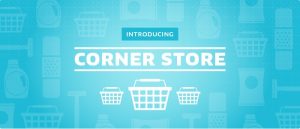Remember when Amazon.com was just an online bookstore? Today the company is a diverse online retailer, for both consumers and businesses, as well as a logistics service provider, cloud services provider, tablet and smartphone developer, and much more.
Remember when Uber was just an app to get a ride somewhere? That’s what we’ll be saying in the not too distant future, as the company continues to experiment and branch into new areas.
Last week, for example, Uber launched Uber Corner Store in Washington, DC where local users can order allergy medicine, diapers, toothpaste and over 100 other items through the Uber app. Here are some details from the announcement:
Starting August 19th, Corner Store will be available Monday – Friday, 9am – 9pm EDT, to a select number of Uber DC riders within a limited area. We’re working to build supply, and will be sure to update you as we extend hours of operation to cover late night and weekend requests!
This is a limited-time-only experiment – but the more you love it, the more likely it will last.
Although the announcement doesn’t provide any details about the order fulfillment process, it appears that Uber has pre-selected a finite number of items and is (presumably) stocking them in a company-owned or leased facility (or maybe multiple locations in the DC area), rather than having drivers pick up the items at local retailers.
In essence, the corner store is a stock-keeping location, where Uber drivers pick up goods ordered by users and then deliver them.
Uber, a new type of convenience store retailer, enabled by a mobile app and a network of drivers — and an emerging competitor to Amazon Fresh, Google Shopping Express, and eBay Now.
If my assumption is correct — that Uber is stocking it own inventory (unlike Google and eBay, which fulfill orders through local retailers) — then Uber will have to acquire some supply chain expertise, especially inventory optimization and network design. And like other same-day delivery providers, Uber will have to figure out how to do it profitably — unless it plans to use Corner Store as a loss leader for its other services.
Uber made another interesting announcement last week: the Uber API. Here are some details from the blog post:
We officially open — to all developers — access to many of the primitives that power Uber’s magical experience. Apps can pass a destination address to the Uber app, display pickup times, provide fare estimates, access trip history and more.
We believe that any app with a map is a potential Uber API partner. To kick things off, we’re launching with 11 fantastic companies, all of whom have already integrated with the API and are rolling out in cities around the world: Expensify, Hinge, Hyatt Hotels & Resorts, Momento, OpenTable, Starbucks Coffee Company, Tempo Smart Calendar, Time Out, TripAdvisor, TripCase and United Airlines.
Will Uber become a value-added feature of a transportation management system (TMS)? Why not, especially for retailers that might want to use Uber as a transportation mode to deliver online orders from local stores (assuming Uber, like Google and eBay, establishes partnerships with leading retailers to provide such a service down the road).
These new services, along with others previously announced like UberRUSH, make it clear that Uber is building the foundation for a much bigger and broader business down the road — a business centered on logistics services. As I wrote a few weeks ago, if you’re a logistics service provider, it would be foolish and dangerous to take Uber (and others like them) for granted.
“Uber is building a digital mesh–a grid that goes over the cities,” is how Shervin Pishevar, formerly a managing director at Menlo Ventures and an investor in Uber, put it in an interview last year. “Once you have that grid running, in everyone’s pockets, there is a lot of potential for what you can build as a platform. Uber is in the empire-building phase.”
Is Uber a technology company, a logistics service provider, or (with Corner Store) a retailer? It’s the blurring of the lines that is opening the door to new business models and services. Not all of Uber’s experiments will succeed, but with each one, the company is looking less like a taxi service and more like Amazon to me.
—-
For related commentary, check out some of our recent episodes and posts on this topic:
- Cracking the Code on Home Delivery
- Debunking the Myths of Same-Day Delivery (Or What Amazon Learned from a 90-Year-Old Distributor)
- The Most Critical Factor in Last-Mile Delivery: Managing the End-Customer Experience











